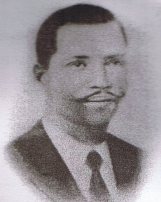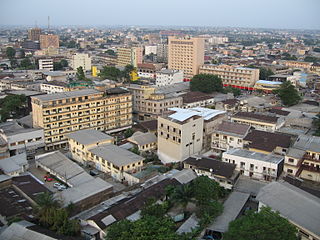Duala or Douala can refer to:

The Duala are a Bantu ethnic group of Cameroon. They primarily inhabit the littoral and southwest region of Cameroon and form a portion of the Sawabantu or "coastal people" of Cameroon. The Dualas readily welcomed German and French colonial policies The number of German-speaking Africans increased in four West African German colonies prior to 1914. The Duala leadership in 1884 placed the tribe under German rule. Most converted to Protestantism and were schooled along German lines. Colonial officials and businessmen preferred them as inexpensive clerks to German government offices and firms in Africa. They have historically played a highly influential role in Cameroon due to their long contact with Europeans, high rate of education, and wealth gained over centuries as slave traders and landowners.

Rudolf Duala Manga Bell was a Duala king and resistance leader in the German colony of Kamerun (Cameroon). After being educated in both Kamerun and Europe, he succeeded his father Manga Ndumbe Bell on 2 September 1908, styling himself after European rulers, and generally supporting the colonial German authorities. He was quite wealthy and educated, although his father left him a substantial debt.

Douala is the largest city in Cameroon and its economic capital. It is also the capital of Cameroon's Littoral Region. Home to Central Africa's largest port and its major international airport, Douala International Airport (DLA), it is the commercial and economic capital of Cameroon and the entire CEMAC region comprising Gabon, Congo, Chad, Equatorial Guinea, Central African Republic and Cameroon. Consequently, it handles most of the country's major exports, such as oil, cocoa and coffee, timber, metals and fruits. As from 2018, the city and its surrounding area had an estimated population of 2,768,400. The city sits on the estuary of Wouri River and its climate is tropical.
Auguste Manga Ndumbe Bell was a leader of the Duala people of southern Cameroon from 1897 to 1908 during the period after the German colonialists assumed control of the region as the Kamerun colony.

Ndumbé Lobé Bell or King Bell was a leader of the Duala people in Southern Cameroon during the period when the Germans established their colony of Kamerun. He was an astute politician and a highly successful businessman.

Jantzen & Thormählen was a German firm based on Hamburg that was established to exploit the resources of Cameroon. The firm's commercial and political influence was a major factor in the establishment of the colony of Kamerun in 1884.

The villa Mandessi Bell situated at Douala is a building constructed between 1904 and 1909 by David Mandessi-Bell a rich farmer and commissioner of the king Rudolf Manga Bell. This building is and architecture from the colonial period. It is a representation and legacy of the German occupation in Cameroon.

The Palace of the Kings Bell situated in Douala is a building constructed in 1905 by the Germans for King Auguste Manga Ndumbe. The building is also known as La Pagode; this name comes from the French writer Louis-Ferdinand Céline, who remained in Douala in 1916-17, who calls it such in his famous novel Voyage au bout de la nuit.

The old German government headquarters situated in Douala is a building constructed in 1891 by the Germans in a classical Prussian style.
The Cameroon Baptist Church is a Baptist Christian denomination in Cameroon. It is affiliated with the Baptist World Alliance. The headquarters is in Douala.

The former Palace of Justice of Douala situated in Douala is a building originally constructed between 1930-31 under the French Mandate.

The former General Hospital situated in Douala is a building constructed in 1896 by the Germans and designed by the architect Henri Drees.

The Bonakouamouang Chimney – situated in Douala, Cameroon in the district of Akwa neighborhood of Bessegue – is a relict of the waterworks built by the Germans at the beginning of the 19th century. The waterworks was part of the first phase of industrial investments aimed at the urbanisation of Kamerunstadt (Douala).

The Cathedral of Saints Peter and Paul - situated in Douala, Cameroon - is the cathedral of the Roman Catholic Archdiocese of Douala and dedicated to St Peter and St Paul.

The Chamber of Commerce in Douala, Cameroon is a building constructed between 1927 and 1928 under the French mandate, under the umbrella of the League of Nations. This building is in a late Art Nouveau architectural style.
The following is a timeline of the history of the city of Douala, Cameroon.

La Nouvelle Liberté is a public artwork in the Deido suburb, in Douala (Cameroun).

















